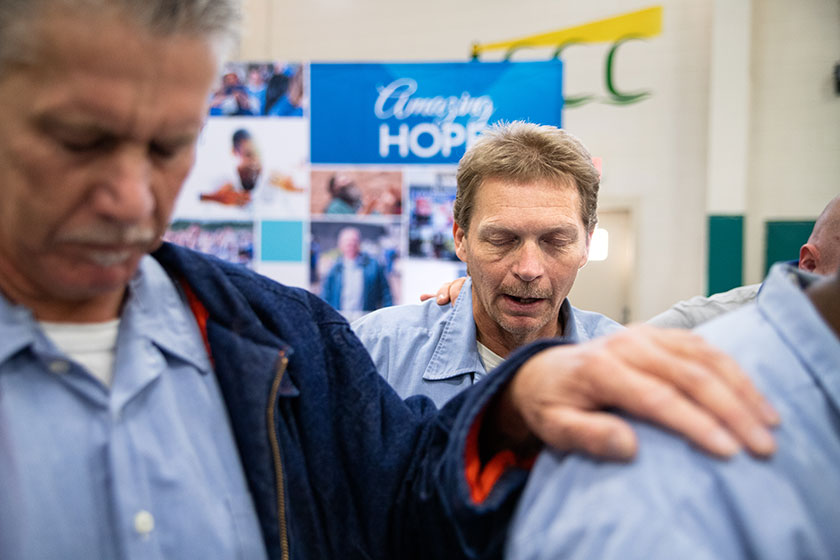Heather Rice-Minus explains Prison Fellowship's restorative approach to justice reform.

In 2019, Prison Fellowship® commissioned a Barna Group poll to determine Christians' perspectives on criminal justice. Two questions focused on justice that restores—our approach to justice reform. This approach can provide opportunities for those responsible for crime to make amends with crime victims.
We found that most Americans agree: The goal of the justice system should be restoration for all. Practicing Christians and evangelicals are much more likely to agree with this restorative approach. We sat down with Vice President of Government Affairs and Church Mobilization Heather Rice-Minus to learn more.
PRISON FELLOWSHIP: Why is a restorative approach to justice important to you?
Heather Rice-Minus: During a year when I lived abroad, my house was broken into while I was home alone. The man who broke into my house [was in] my bedroom while I was sleeping. Luckily, I woke up and screamed at the top of my lungs, and he ended up running away. I wasn't physically harmed, but to this day, we never found him. I don’t think I had a good night's rest for the remainder of the time I lived in that apartment. Even now, when I travel on my own, I sometimes keep the lights on when I sleep. There's just this sense of not being able to know who did it, not being able to know why, not being able to share how it harmed me. A restorative approach to justice is important to me because it includes more opportunities for victims to share the harm that's happened to them and how the person who's harmed them can begin to make things right.
What are the benefits of a restorative approach to justice?
A restorative approach that includes proportional accountability, constructive corrections culture, and second chances better equips people for success once they finish their sentence. That means fewer victims in the future. And it also gives people who have committed a crime the opportunity to transform and make amends for what they've done.
What does it look like for someone who commits crime to "make amends"?
It should always be the victim's right to choose whether they want to interact with the person who's harmed them. If they do, then we think it's a great opportunity for those who have harmed someone to actually come together with that person. That process can sometimes happen in what's called victim-offender mediation (though we don't use the term "offender" here at Prison Fellowship). It's something a victim can even do long after a trial and sentencing—it may take time before a victim is open to it. It can help victims share the impact crime has had on them and get a better sense of why the incarcerated person committed the crime.
There are also restorative justice programs that are sometimes used in lieu of the traditional justice system. The victim can speak into what accountability should look like and the responsible party may avoid incarceration or a criminal record if they meet the requirements of the program.
Additionally, there are also lots of ways for incarcerated people to make amends indirectly. There are dog training programs where prisoners train dogs that will go on to serve people outside prison who have disabilities. There are also community service opportunities for incarcerated people. I know of a former warden in North Dakota named Colby Braun who created a garden inside the North Dakota State Penitentiary. The incarcerated men grow vegetables that are donated to a homeless shelter in the community. So things like that where people are able to have a tangible way to give back, even if it's not to the person they directly harmed, but the community in general.
Finally, there's also the personal transformation work that can happen in prison where someone demonstrates that, "I'm trying to address the underlying thinking that brought me to prison." Whether victim-impact classes or other cognitive behavioral programs, those are also forms of making amends and earning back the public's trust.
What does Prison Fellowship do to help incarcerated people reconcile with communities and victims?
Although Prison Fellowship isn't a direct practitioner of restorative justice or victim-offender mediation, through the Prison Fellowship Academy® we're providing those personal transformation and indirect opportunities to make amends I talked about. The Academy curriculum addresses victim impact and the underlying behaviors or thoughts that led someone to commit crime. Additionally, we advocate for prison and reentry program funding and policies that advance a constructive corrections culture.
Practicing Christians and evangelicals are significantly more likely than the rest of Americans to agree with a restorative approach to the justice system. Why do you think that is?
Well, it's the theme of the Bible. There are stories of people doing horrible things to other people in the Bible. But the theme throughout the gospel is that God brings everything to restoration in the end, despite all those wrongs. That's the story of Jesus' sacrifice—dying on our behalf so we can be restored to Him. Those underlying themes are the foundation of our faith. And so, I think it's clear for us that that's the ultimate vision for being justified in our faith, as well as for justice in this world.

ABOUT HEATHER RICE-MINUS
Heather Rice-Minus serves as vice president of government relations and church mobilization at Prison Fellowship. She directs national advocacy initiatives and campaigns on pivotal criminal justice issues at the federal level. She also spearheads Prison Fellowship's efforts to awaken and equip churches and build coalitions with advocacy groups, think tanks, faith-based organizations, and other key stakeholders.
SEE WHAT CHRISTIANS THINK ABOUT CRIMINAL JUSTICE!
A restorative approach to justice is just one of the many subjects covered in Barna’s recent poll commissioned by Prison Fellowship. Read the full report to learn what Christians and other Americans think about incarceration, justice reform, and more.
DID YOU ENJOY THIS ARTICLE?
Make sure you don' t miss out on any of our helpful articles and incredible transformation stories! Sign up to receive our weekly newsletter, and you' ll get great content delivered directly to your inbox.
Your privacy is safe with us. We will never sell, trade, or share your personal information.